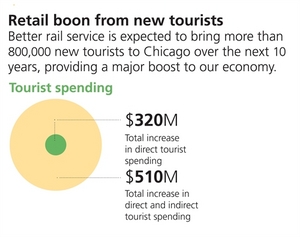| « Use Yer Hed Part! | The Unhelpful Voucher Conversation » |
Transportation Thu May 06 2010
MPC Maps Out Benefits of High-Speed Rail

In late January, as part of the American Recovery and Reinvestment Act (ARRA), President Obama awarded $8 billion in high-speed rail grants to 31 states, including just over $1 billion to Illinois to improve tracks, signal systems and stations on the existing Chicago-St. Louis-Kansas City corridor (pdf).
While Mechanics readers are prone to ponder if high-speed rail makes any economic sense at all, advocates with the Metropolitan Planning Council (MPC) tend to think otherwise. The non-profit recently released a report stating that in the next 10 years, roughly 800,000 new tourists will visit Chicago because of the rail improvements, pumping the local economy with some serious cash. Researchers analyzed how much money tourists will spend (which they call direct spending), how much money Chicagoans will spend as a result of this tourist spending (called indirect spending) and "how our state and local tax revenues will grow as a result."
The MPC came up with these numbers:
$320 million in direct new tourist spending
$510 million in total direct and indirect spending as a result
$120 million in new state and local tax revenue
5,300 jobs as a result of tourist spending and building of the Englewood flyover bridge near 63rd street
$2.6 billion of additional income from job creation
Additionally, as people rely less on planes, buses and cars, the environment will also get a boost. The MPC estimates that 9.3 million barrels of gas will be saved along with 12 million tons of CO2, which MPC Fiscal Policy Manager Chrissy Nichols notes is "the equivalent of half a million roundtrip car trips from Chicago to St. Louis."
The only caveat? The initial investment won't exactly create high-speed rail as it is known in other countries. Nichols writes, "While the $1.2 billion investment will cut the time it takes to get from Chicago to St. Louis by an hour-and-a-half to four hours, at an average speed of 62 mph it will be far from the high-speed bullet trains whizzing around Europe and Japan."
Read Nichols' full piece here and see the full MPC fact sheet here (pdf).












LOL / May 7, 2010 1:48 PM
$1 billion = a 90 minute shorter trip?
800,000 people will visit "because" of rail improvements? Right.
9.3 million barrels of oil saved? Did they factor in how many barrells of oil would be used in constructing the new railway?
At least you correctly refer to them as advocates, because their analysis has the weight of a single linear equation stacked with general assumptions at each variable - look at their "fact sheet"